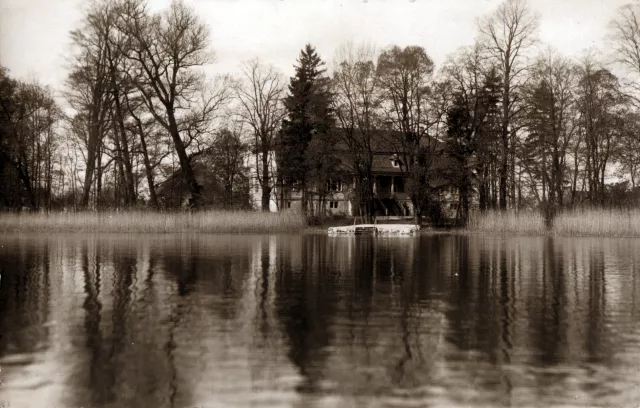Eva Bato's family estate in Seesen, Germany
This is our summer house, a 15-room mansion in Seesen, near Berlin. I grew up there, not in Berlin. We had a gigantic park. We bred racehorses. Every member of the family had a car. There were many servants: from the butler to the cook, from the chauffeur to the 'lady's companion.' We observed Shabbat, but they did not dare take me to synagogue. Anti-Semitism was increasing. In 1927, it had become so bad that my mother declared she could not stand it any longer, and she moved us back to Pest.
My father, Tibor Bato, was born in Budapest in 1896. He studied for four years in an English gymnasium in Cairo, where his father was organizing the network of the Adria Insurance Company in Egypt and the Middle East. My father and grandmother moved back to Europe so that my father could finish his Hungarian education. He then went to Vienna and studied commerce at the Oriental Academy. When World War I began, my father was sent to the front. My father was a many-times decorated officer. After World War I, my father lived in Berlin, where he worked at Shell Oil. When he moved back to Hungary, he was the representative of Shell's Hungarian office. After the anti-Jewish laws were enacted, he started his own company, which bought oil from Shell and distributed it.
My mother, Erzsebet Illes, was born in Budapest in 1899. She drew beautifully and was accepted into the Academy of Applied Arts, but then she met my father while still very young, married, and left the Academy. My parents later divorced.
As far back as I can remember, my mother went to synagogue every Friday. She couldn't read Hebrew, but was a very good Jew. My mother was the director of a hospice for old women. It was established when millionaire women, all Buda Jews, made up their minds to buy a villa, which my mother had renovated to create a hospice. In 1945, she opened an orphanage instead of reopening the home for the elderly. There were masses of Jewish orphans. Those girls all learned a trade. Those who were school-age went to school; those who were too young went to kindergarten. She also turned a private flat into a synagogue. In 1950, the wave of nationalization reached the villa. When the Jewish orphanage was kicked out of the building, it got another site. And my mother arranged everything there, started all over again. The whole group of them, including Mother, moved there.
I was born in 1921. I became a doctor. In 1944, the Germans occupied the Jewish hospital and turned it into a war hospital. They insisted I stay as an interpreter, help them acquire supplies and work in the lab. I did not do it. My mother transformed another site into an emergency hospital. I worked there, until my Aunt Margit came to hide me in her home. She was spared because of her Christian husband. Immediately after the war, I went back to work at the Jewish charity hospital. I have been married three times. I quit working when I was 80. I have no family, but I am not alone.



































